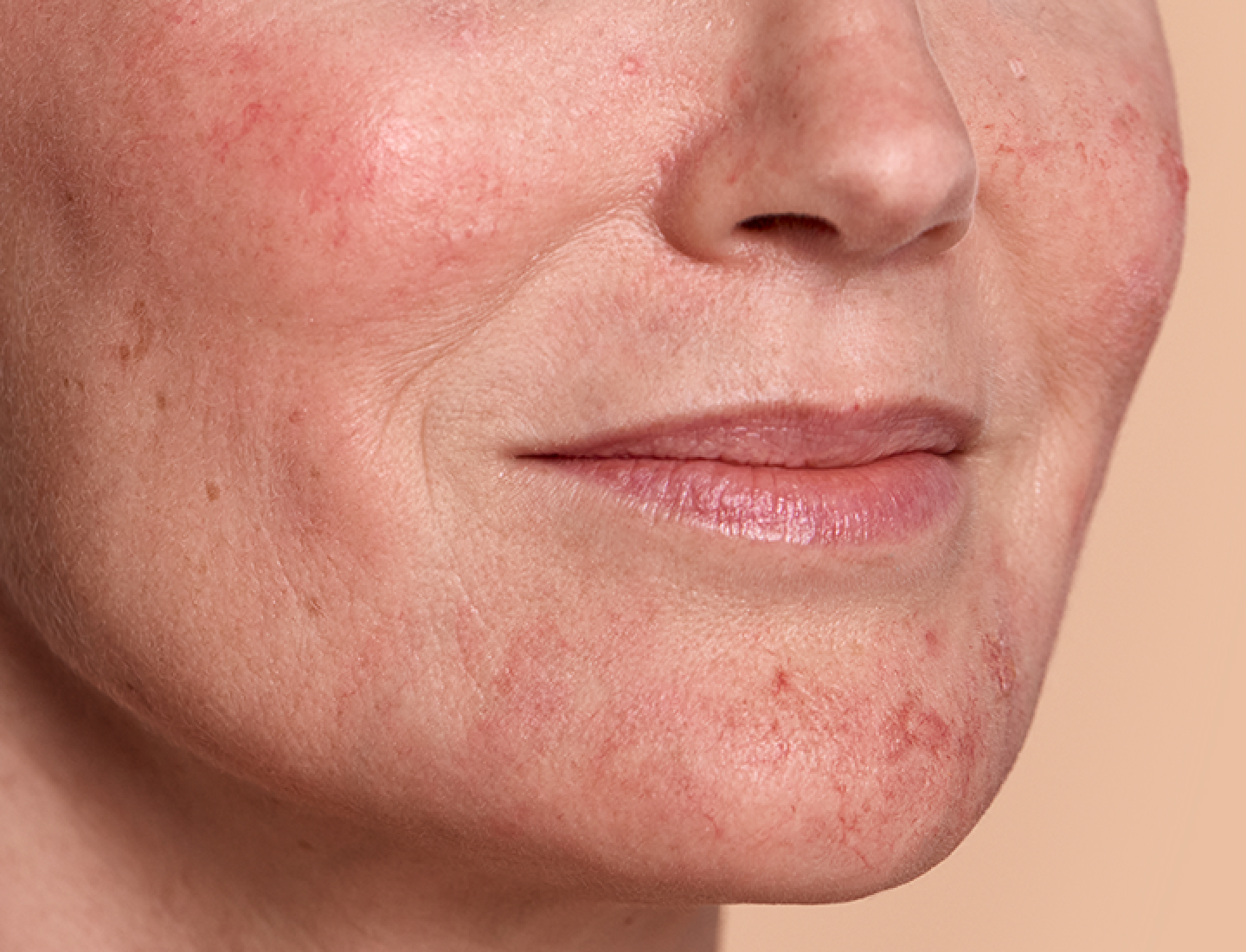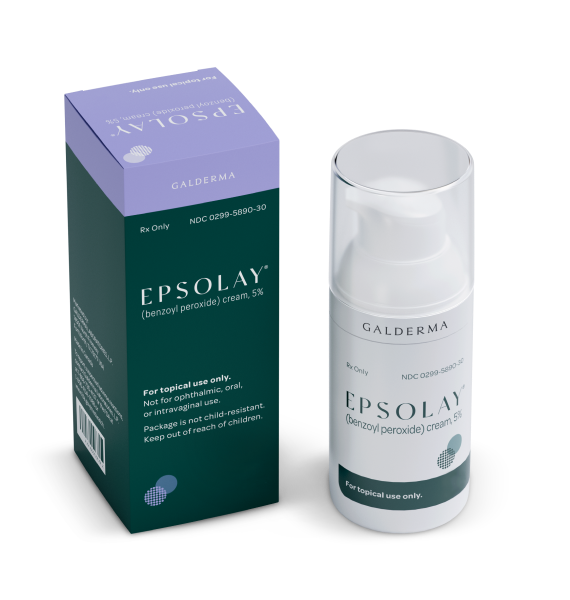
All about rosacea
It's more common than you think1
You’re not alone—more than 16 million people in America are affected by rosacea.1 It’s a chronic and persistent skin condition, so the redness and blemishes can come and go, flare up unexpectedly, and even get worse over time. And, it can deeply affect self-esteem and mental health.2-4
Anyone can get rosacea, though some people are more prone to it5
Men and women of all skin colors and skin types can be diagnosed with rosacea, but here are some groups that have a higher chance of developing rosacea1,5:
- Women
- Men are less likely to develop rosacea, though when they do, they are often prone to more severe symptoms like skin thickening
- People between the ages of 30 and 50
- People of Irish, German, or English ancestry who have fair skin
- People with a family history of rosacea
- People with a history of a lot of acne cysts and/or nodules
Signs and symptoms of rosacea
-
Facial redness (erythema)
The tendency to blush or flush easily, or persistent facial redness that tends to affect the cheeks, nose, and forehead near the center of the face.1,7
-
Skin irritation or discomfort
Your skin may be very sensitive or swollen and you could experience some itching, burning, or even a stinging sensation on your face.1,7
-
Bumps and blemishes (inflammatory lesions)
Acne-like breakouts are a common symptom of rosacea. Though these bumps and blemishes look like acne, treating them with certain acne medications can upset sensitive skin and make your rosacea even worse.1,2,7,8
-
Broken blood vessels (telangiectasias)
You may see small, visible, broken blood vessels on your face that are also known as "spider veins."1,7
Typical triggers of rosacea
-
Sun exposure
-
Spicy foods
-
Alcohol
-
Extreme temperatures
-
Stress
-
Exercise
Lifestyle tips that can help clear a path to clearer skin
-
1
Know your triggers
Flare-ups that may resemble acne-like breakouts are common if you have rosacea. Knowing what can trigger the flare-ups, and avoiding those things can help prevent rosacea from worsening.1,3,9
-
2
Avoid extreme temperatures
Temperatures outdoors and indoors, ranging from cold winter winds to hot baths, can trigger flare-ups. Turn the heat down, or limit the time your skin is exposed to extreme temperatures. 1
-
3
Moisturize and protect
People with rosacea often have highly sensitive skin that is reactive to sun exposure. Moisturizing can help protect the skin's barrier, and using a gentle, broad-spectrum sunscreen with an SPF of 30 or higher can help fight everyday triggers.1
-
4
Find a good dermatologist
Having rosacea can be disheartening.1 The good news is, once you know what it is, you can learn how to treat it. Together with your dermatologist, you can help find the right treatment and skincare routine that works for you.
Find one now -
5
Take care with your skin routine
Harsh exfoliants and alcohol-based products can aggravate blemishes, leading to more redness and breakouts. So go for something gentler, including makeup. Look for products that are6:
✓ Oil free
✓ Scent free
✓ Alcohol freeAnd remember, be sure to test new products on your arm or neck to see if you have a reaction.10
-
6
Keep a positive outlook
The truth is, skin treatments and new routines can take time to improve the symptoms of rosacea and the impact isn’t always immediate.1 But, a positive outlook and patience can go a long way. And with the right dermatologist and treatment, you can see results.


References: 1. Buddenkotte J, Steinhoff M. Recent advances in understanding and managing rosacea. F1000 Research. 2018;7(F1000 Faculty Rev):1885. doi:10.12688/f1000research.16537.1 2. Galderma Laboratories, L.P.; data on file. Clinical Study Report SGT-54-01; January 8, 2020. 3. Oztürkcan S, Ermertcan AT, Sahin MT, Afşar FS. Efficiency of benzoyl peroxide-erythromycin gel in comparison with metronidazole gel in the treatment of acne rosacea. J Dermatol. 2004;31:610-617. doi:10.1111/j.1346-8138.2004.tb00566.x 4. Huynh TT. Burden of disease: the psychosocial impact of rosacea on a patient’s quality of life. Am Health Drug Benefits. 2013;6(6):348-354. 5. Rosacea: who gets and causes. American Academy of Dermatology Association. Accessed November 19, 2021. https://www. aad.org/public/diseases/rosacea/what-is/causes 6. Rosacea: overview. National Institutes of Health. Accessed October 18, 2021. https://www.ncbi.nlm.nih.gov/books/NBK279476/ 7. Rosacea: signs and symptoms. American Academy of Dermatology Association. Accessed October 18, 2021. https://www.aad.org/public/diseases/rosacea/what-is/symptoms 8. Leyden JJ. Randomized, phase 2, dose-ranging study in the treatment of rosacea with encapsulated benzoyl peroxide gel. J Drugs Dermatol. 2014;13(6):685-688. 9. Triggers could be causing your rosacea flareups. American Academy of Dermatology Association. Accessed October 18, 2021. https://www.aad.org/public/diseases/rosacea/triggers/find 10. Greenlaw E. Skincare tips for rosacea. WebMD. Accessed November 19, 2021. https://www.webmd.com/skin-problems-and-treatments/features/rosacea-skin-care-tips 11. EPSOLAY (benzoyl peroxide) cream, 5% [Prescribing Information]. Whippany, NJ: Sol-Gel Technologies Ltd.; April 2021.
IMPORTANT SAFETY INFORMATION
Indication: EPSOLAY® (benzoyl peroxide) Cream, 5% is indicated for the treatment of inflammatory lesions of rosacea in adults. Adverse Events: The most common adverse reactions (incidence ≥ 1%) in patients treated with EPSOLAY Cream were pain, erythema (redness), pruritus (itching) and edema (swelling), all at the application site. Warnings/Precautions: Patients using EPSOLAY Cream may experience hypersensitivity reactions, including anaphylaxis (acute allergic reaction), angioedema (rapid swelling), and urticaria (hives). If serious hypersensitivity reaction occurs, discontinue use of EPSOLAY Cream immediately and seek medical attention/initiate appropriate therapy. Skin Irritation/contact dermatitis may be experienced, including erythema (redness), scaling, dryness, and stinging/burning. Irritation and contact dermatitis may occur. Use a moisturizer and discontinue EPSOLAY Cream if symptoms do not improve. Avoid application to cuts, abrasions, eczematous, or sunburned skin. EPSOLAY Cream may increase photosensitivity, sensitivity to ultraviolet light. Minimize or avoid exposure to natural or artificial sunlight (tanning beds or UVA/B treatment). Use sunscreen or protective clothing when sun exposure cannot be avoided. Discontinue use of EPSOLAY Cream at the first evidence of sunburn.
You are encouraged to report negative side effects of prescription drugs to the FDA. Visit www.fda.gov/medwatch or call 1-800-FDA-1088
